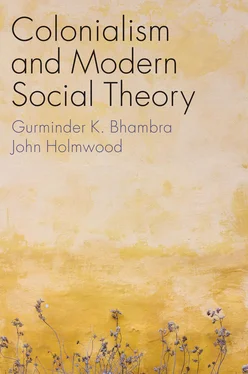We have both taught modules on social and sociological theory over the years and thank our students, colleagues, and the institutions where we worked for the opportunity to think through these issues in a variety of contexts. Gurminder would like to thank her colleagues at the University of Sussex – in particular Buzz Harrison, Ali Kassem, Louiza Odysseos, and Anna Stavrianakis – and her colleagues in Sweden – in particular Gunlög Fur, Peo Hansen, Johan Höglund, and Stefan Jonsson. John would like to thank colleagues at the University of Nottingham – in particular Christian Karner, Roda Madziva, and James Pattison – and colleagues in Prague – Jan Balon, Radim Hladík, Jan Maršálek, and Marek Skovajsa. Thanks are also due to the Institute of Philosophy of the Czech Academy of Science and to the Czech Research Council for research funding associated with the history of sociology drawn on in the book.
We would like to thank Steve Kemp, Desmond King, Robbie Shilliam, and Andrew Wells for their close engagement with the manuscript at its various stages and for alerting us to errors and pitfalls for the removal of which we are really grateful. We would also like to thank Ipek Demir, Vicky Margree, Lucy Mayblin, William Outhwaite, and Mia Rodriguez-Salgado for their comments and suggestions for improving the manuscript. For conversations and collegial sustenance during the period of writing this manuscript, we owe a debt of gratitude to Bob Antonio, Michaela Benson, James Hampshire, Pauline von Hellerman, Zdenek Kavan, Julia McClure, Kathryn Medien, Karim Murji, Adam Seligman, and Heba Youssef.
Our editor at Polity Press, Jonathan Skerrett, has been especially supportive of the project, as has Karina Jákupsdóttir. We would also like to thank Manuela Tecusan for her close and thoughtful attention to the manuscript.
Introduction Colonialism, Historiography, and Modern Social Theory
Modern social theory is a product of the very history it seeks to interpret and explain. Although some have presented theoretical concepts as standing outside history and, as such, as universal foundations for any understanding, this view is now significantly discredited by post-positivist philosophies of science. Theorising, like other human activities, is historically located and subject to change. It reflects its social circumstances, including the social relationships in which it is produced. Knowledge, where it is the product of privileged knowers, involves the exclusion of other knowers and marginalises their knowledges. These, then, exist as either alternative knowledges or oppositional, subaltern knowledges, outside the categories of what is presented as the mainstream. However, like Lynn Hankinson Nelson (1990), we do not see this as necessarily entailing a relativist argument. Expanding the range of knowers, we argue, is the basis for developing better understandings through dialogue and reconstruction. In this book we are seeking to address the categories that form mainstream sociology in order to reconstruct modern social theory through dialogue. We seek a more adequate account of modernity, inclusive of its otherwise disregarded legacies of colonialism, so that we can more effectively address pressing issues of the present. In this way we are seeking to reconstruct mainstream social theory rather than to dismiss it.
The argument that theoretical engagements with the world have a history applies across all disciplines, although our concerns are directed primarily at just three – sociology, politics, and history. The fact that history itself has a history is of profound significance to any understanding of social theory. The latter, as we shall see, is presented as being formed in the rise of modernity, that is, historically. Yet historical accounts of the processes attributed to modernity have themselves been subject to reinterpretation. One paradox of modern social theory as a historically formed enterprise is that it does not appear to be changed by changing historiographic accounts. Rather it relies upon a relatively unchanging view of the rise of the West, associated with the emergence of democracy, industry, and science. In this book, then, we draw upon newly understood histories associated with the recognition of colonialism and empire within the development of modern societies; and we do this with the aim of reconstructing social theory – in its European variant.
What we mean by reconstruction will become clear in the course of the book. But we should state at the outset that we are committed to criteria of coherence and explanatory rigour. One of the ways in which the categories of mainstream social theory are maintained is by arguing that there can be different orientations to social issues and that they derive from different value positions or definitions of the problem. These different orientations cannot be reconciled, but inquiries based upon them have common standards. As we shall see, these common standards are precisely what is at issue because they were formed in the course of the development of substantive theoretical claims that have been challenged. While the primary focus of this book is upon those substantive claims and how the colonial context bears upon them, we also address seemingly abstract methodological arguments, which have arisen in the context of denying the need for a more fundamental reconstruction of categories and concepts.
Theoretical development necessarily takes place through dialogue, and that dialogue is fundamentally altered by changes in the audience of social theory and its practitioners. Nelson powerfully demonstrates the significance of epistemological communities – and also their changing and overlapping natures, which are consequent upon the emergence of feminism and the inclusion of women in the academy. Feminism did not simply introduce new ways of knowing the world, it also transformed previously dominant ones, ways that had seemed secure. In this book we are arguing for a similar process with regard to colonialism and its legacy, both within modern social structures and within representations in modern European social theory.
While much postcolonial analysis is oriented towards the Middle East and South Asia (see Said 1995 [1978], Spivak 1988, Bhabha 1994) and decolonial studies focus on South America, the Caribbean, and, to a lesser extent, Africa (see Keita 2002, Mignolo 2007, Quijano 2007, Tageldin 2014, Ndlovu-Gatsheni 2015), the one part of the world most in need of such analysis is Europe itself. Europe is in urgent need of decolonisation and, paradoxically, this kind of process can happen only by taking seriously its colonial histories and by explicitly working through their contemporary manifestations. The world subjugated by Europe cannot examine issues in the present without taking into account that the past of having been colonised is central. Within Europe, however, there appears to be no recognition of a corresponding obligation (Césaire 2000 [1955]; for discussion, see Viveros-Vigoya 2020). Colonisation, it is assumed, was something that happened elsewhere – albeit at the hands of Europeans – and consequently has no perceived bearing on contemporary European politics. This is so both in terms of issues related to national polities in Europe and in terms of their relations to one another (as for example in the construction of the European Union) and to the rest of the world (Bhambra 2009).
In this book, then, we address how colonialism was the context for the particular forms and practices of knowledge associated with modern social theory as it is expressed within the ‘western’ academy and its canons. We draw on the understandings of scholars who write from postcolonial and decolonial perspectives, but we are not concerned here to set out the nature of their arguments. They have been discussed elsewhere (see Bhambra 2007, 2014). Rather we are concerned with the colonial entanglement of mainstream European social theory and, in particular, with those writers who have come to be regarded as figures central to it. In this sense we are engaging in a critique of the canon, but not with the purpose of either adding to it or denying it. Our purpose is to show how the canon – which we discuss below – has been used to develop concepts and categories for the understanding of modernity that elide its broader colonial context. By restoring that context, we seek to renew European social theory as an entity capable of learning from others and of contributing to general social theory, as one part of a global project.
Читать дальше












